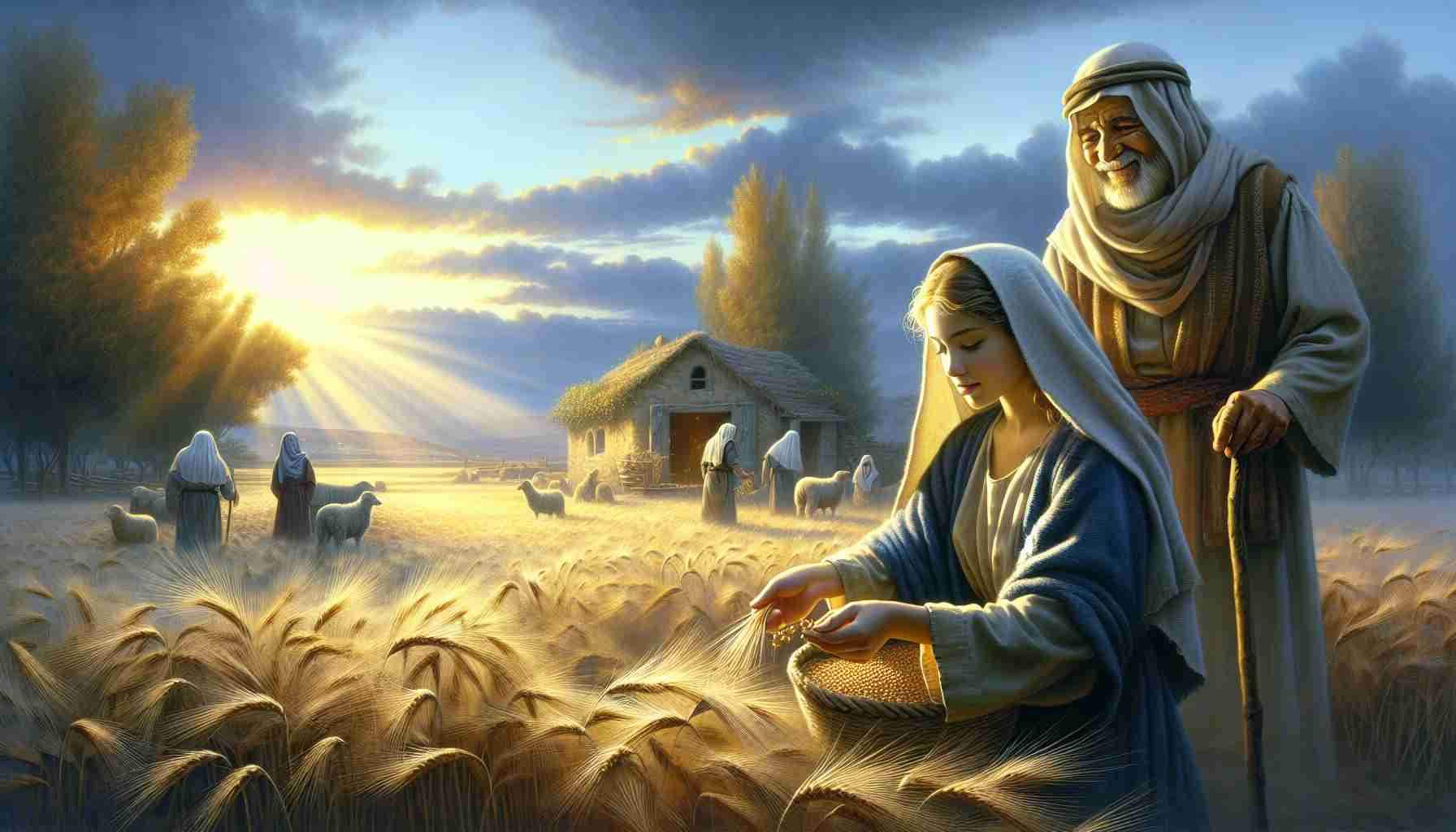

I wasn’t a prophet or a priest—just a boy from Beit Lechem—the town you may know as Bethlehem. My name is Toban. I used to work in the fields that belonged to Boaz, the respected elder with kind eyes and a strong voice.
I still remember the day she arrived—Ruth, they said her name was. A Moabite woman, from far beyond the Jordan. People whispered when she walked by, talking of bitter Naomi and her strange daughter-in-law. “Why did she come back with her?” they muttered. But I saw something in Ruth’s eyes. Not fear—though she had come to a place where she knew no one—but something deeper. Devotion.
Every morning, Ruth rose before the sun and walked behind the harvesters, gathering leftover barley. Gleaning, it’s called—a right the Torah gives to the poor. But few did it as humbly as she did. She never complained. She never took more than she needed. I asked her once, “Why do you work so hard?”
She looked at me with eyes so calm it quieted my heart and said, “Because Naomi needs me. She was kind to me when I had no one. I will not leave her.”
People didn’t expect a Moabite woman to show such loyalty. But Ruth didn’t live by expectations—she lived by faith. She had left her gods, her land, and her family to be part of us, to follow Hashem—the name we use to speak of God with reverence. That kind of courage was rare.
Boaz noticed her, too. Not just her beauty—though that was clear—but her kindness. He told the workers, including me, “Let her glean safely. And leave behind some extra stalks for her to gather.” When I saw that, I knew Ruth’s quiet strength had touched him.
But it was more than kindness. Boaz was related to Naomi’s late husband, and by our laws, he could become Ruth’s redeemer—meaning he could marry her to honor the family line. That’s just what he did. Not because he had to. But because she had given everything for love and faith.
The day Ruth and Boaz married, the whole town rejoiced. Even old Naomi smiled again. I helped tie up the wedding tent, and I remember thinking: something great is beginning here.
And I was right.
Ruth had a son—she named him Oved. He grew strong in Boaz’s fields and laughed beneath Naomi’s care. Oved would become the father of Yishai—better known as Jesse—and Jesse would one day raise David, the shepherd who became king of all Israel.
Yes, Ruth’s story began in sorrow. She lost a husband, a home, a future. But her loyalty—her choice to stay, to believe, to walk with Naomi—wove a thread through history. Her faith didn’t just change Naomi’s life. It shaped a kingdom.
And I, Toban, field boy of Beit Lechem, got to witness the start of it all.
I wasn’t a prophet or a priest—just a boy from Beit Lechem—the town you may know as Bethlehem. My name is Toban. I used to work in the fields that belonged to Boaz, the respected elder with kind eyes and a strong voice.
I still remember the day she arrived—Ruth, they said her name was. A Moabite woman, from far beyond the Jordan. People whispered when she walked by, talking of bitter Naomi and her strange daughter-in-law. “Why did she come back with her?” they muttered. But I saw something in Ruth’s eyes. Not fear—though she had come to a place where she knew no one—but something deeper. Devotion.
Every morning, Ruth rose before the sun and walked behind the harvesters, gathering leftover barley. Gleaning, it’s called—a right the Torah gives to the poor. But few did it as humbly as she did. She never complained. She never took more than she needed. I asked her once, “Why do you work so hard?”
She looked at me with eyes so calm it quieted my heart and said, “Because Naomi needs me. She was kind to me when I had no one. I will not leave her.”
People didn’t expect a Moabite woman to show such loyalty. But Ruth didn’t live by expectations—she lived by faith. She had left her gods, her land, and her family to be part of us, to follow Hashem—the name we use to speak of God with reverence. That kind of courage was rare.
Boaz noticed her, too. Not just her beauty—though that was clear—but her kindness. He told the workers, including me, “Let her glean safely. And leave behind some extra stalks for her to gather.” When I saw that, I knew Ruth’s quiet strength had touched him.
But it was more than kindness. Boaz was related to Naomi’s late husband, and by our laws, he could become Ruth’s redeemer—meaning he could marry her to honor the family line. That’s just what he did. Not because he had to. But because she had given everything for love and faith.
The day Ruth and Boaz married, the whole town rejoiced. Even old Naomi smiled again. I helped tie up the wedding tent, and I remember thinking: something great is beginning here.
And I was right.
Ruth had a son—she named him Oved. He grew strong in Boaz’s fields and laughed beneath Naomi’s care. Oved would become the father of Yishai—better known as Jesse—and Jesse would one day raise David, the shepherd who became king of all Israel.
Yes, Ruth’s story began in sorrow. She lost a husband, a home, a future. But her loyalty—her choice to stay, to believe, to walk with Naomi—wove a thread through history. Her faith didn’t just change Naomi’s life. It shaped a kingdom.
And I, Toban, field boy of Beit Lechem, got to witness the start of it all.